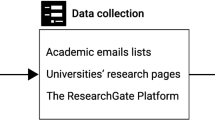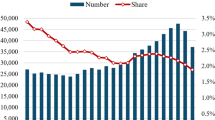Abstract
This paper discusses the relationship between internationalisation, mobility, quality and equality in the context of recent developments in research policy in the European Research Area (ERA). Although these developments are specifically concerned with the growth of research capacity at European level, the issues raised have much broader relevance to those concerned with research policy and highly skilled mobility. The paper draws on a wealth of recent research examining the relationship between mobility and career progression with particular reference to a recently completed empirical study of doctoral mobility in the social sciences (Ackers et al. Doctoral Mobility in the Social Sciences. Report to the NORFACE ERA-Network, 2007). The paper is structured as follows. The first section introduces recent policy developments including the European Charter for Researchers and Code of Conduct for the Recruitment of Researchers and the European Commission’s Green Paper on the ERA. The discussion focuses on concerns around the definition of ‘mobility’ and the tendency (in both policy circles and academic research) to conflate different forms of mobility and to equate these with notions of excellence or quality. Scientific mobility is shaped as much by ‘push’ factors (limited opportunity) as it is by the ‘draw’ of excellence. Scientists are exercising a degree of ‘choice’ within a specific and individualised framework of constraints. The following sections consider some of the ‘professional’ and ‘personal’ factors shaping scientific mobility and the influence that these have on the relationship between mobility, internationalisation and excellence. The paper concludes that mobility is not an outcome in its own right and must not be treated as such (as an implicit indicator of internationalisation). To do so contributes to differential opportunity in scientific labour markets reducing both efficiency and equality.
Similar content being viewed by others
Notes
Other factors such as relative remuneration or conditions of employment may still precipitate moves.
Details of all of the projects can be found on our website at www.liverpool.ac.uk/law/elprg.
NORFACE is a partnership of twelve research agencies in the social sciences in receipt of core funding from the European Commission’s 6th Framework Programme, under ERA-NET. The NORFACE partners include Denmark, Estonia, Finland, Germany, Iceland, Ireland, Norway, Portugal, Slovenia, Sweden, the Netherlands and the UK.
For further details on the methods adopted please refer to the full report on the ELPRG website.
With the exception of members of the new Member States moving into countries where mobility is hampered by transition arrangements (Currie 2006).
The ELPRG are responsible for the coordination of a work package on scientific mobility as part of an EU-funded study of science and inequality. Details of the ResIST project and preliminary findings can be found at http://www.resist-research.net.
Interestingly the perception in the UK is rather different. It is not so much that people anticipate a fear of re-entry but rather that they are ‘only as good as their last position in the UK—unless they have been to the US’ (as one respondent put it). The suggestion here is that it may delay progression.
Examples of where experience overseas is a formal requirement were identified in Poland (The Nenski Institute reported in Ackers and Gill (2008)) Portugal (see quote by Professor Wall at the end of this paper) and Sweden (Högskoleverket 2005, p. 60) but we have heard of other examples. Even where it is not a formal requirement it may be deeply engrained in institutional culture privileging those who have such experience.
Research in a previous project identified a number of researchers in prestigious UK universities working on an unpaid basis for periods of time in order to accrue this reputational capital.
It is interesting to note that similar concerns were expressed in our work with Polish and Bulgarian scientists although the focus was not so much on the choice of topic as loss of sustainable approaches and techniques that they could employ in their country of origin on return (Ackers and Gill 2008).
Previous research suggests that gender, is not in itself a key determinant of mobility at doctoral level. However, responses to the presence of caring responsibilities and children may impact on men and women in different ways (Ackers and Stalford 2007; Ackers and Gill 2008).
This is not an issue we have researched directly. We have, however, gained the impression that some ethnic groups could experience some prejudice or racism in different national contexts even if this arises out of lack of awareness. This was certainly the perception of one of our doctoral researchers from Kenya interested in conducting empirical research in Poland.
For more discussion of the impact of children on scientific mobility see Ackers 2003; Ackers and Stalford 2007.
The UK response is used here as an illustration. The author has not conducted a comprehensive review of Member States’ responses.
The importance of employment security to mobility decisions is discussed in Ackers and Oliver (2007).
The importance of time to migration motivations is also emphasised in Jons’ work where it emerges as the most critical factor and especially in the social sciences (2007, p. 110).
It is interesting to note here that in such circumstances mobile scientists are ‘opting’ not to be treated as full citizens because they prefer to delimit their contributions and invest in their welfare at home.
Many of our Polish and Bulgarian respondents held ‘retained positions’ in their home country sometimes for many years (Ackers and Gill 2008).
Portuguese grants pay almost double the monthly rate during periods abroad.
References
Ackers, Helen Louise. 1998. Shifting spaces: Women, citizenship and migration in the European Union. Bristol: Policy Press.
Ackers, Helen Louise. 2003. The participation of women researchers in the TMR programme of the European Commission: An evaluation. European Commission.
Ackers, HelenLouise. 2004. Managing work and family life in peripatetic careers: The experiences of mobile women scientists in the European Union. Women’s Studies International Forum 27(3): 189–201. doi:10.1016/j.wsif.2004.03.001.
Ackers, Helen Louise. 2005a. Moving people and knowledge: Assessing the impact of enlargement on scientific mobility within the European Union. International Migration (Geneva, Switzerland) 43(5): 100–131. doi:10.1111/j.1468-2435.2005.00343.x.
Ackers, Helen Louise. 2005b. Promoting scientific mobility and balanced growth in the European Research Area. INNOVATION: The European Journal of Social Science Research 18(3): 301–318. doi:10.1080/13511610500186680.
Ackers, Helen Louise, and Bryony Gill. 2008. Moving people and knowledge: Understanding the processes of scientific mobility within an enlarging Europe. Cheltenham et al.: Edward Elgar.
Ackers, Helen Louise, Bryony Gill, and Jess Guth. 2007. Doctoral mobility in the social sciences. Report to the NORFACE ERA-Network. http://www.liv.ac.uk/law/elprg/docs/NORFACE_SUMMARY_REPORT_FINAL_June_08_Agreed_with_ESRC.pdf. Accessed 3 November 2008.
Ackers, Helen Louise, Bryony Gill, Keleigh Groves, and Elizabeth Oliver. 2006. Assessing the impact of the Roberts review enhanced salaries and stipends on postdoctoral and postgraduate positions. Swindon: RCUK.
Ackers, Helen Louise, and Elizabeth Oliver. 2007. The effect of regulation in the area of fixed term contracts on the recruitment and retention of early career researchers in the UK. International Studies of Management and Organization 37(1): 3–79. doi:10.2753/IMO0020-8825370103.
Ackers, Helen Louise, and Helen Stalford. 2007. Managing multiple life courses. The influence of children on migration processes in the European Union. Social Policy Review 19: 321–342.
Agunias, Rannveig Dovelyn, and Newland Kathleen. 2007. Circular migration and development: Trends, policy routes and ways forward. Washington, DC: Migration Policy Institute (MPI) Policy Brief.
Bell, David. 2004. A brief survey of UK academic economics. Report commissioned by the Economic and Social Research Council.
Currie, Samantha. 2006. ‘Free’ movers? The post-accession experience of accession-8 migrant workers in the UK. European Law Review 31(2): 207–229.
Dickmann, Michael, Noeleen Doherty, and Chris Brewster. 2006. Why do they go? Individual and corporate perspectives on the factors influencing the decision to accept an international assignment. Paper to the Academy of Management Annual Meeting. Atlanta, USA, August 11–16.
ELPRG. 2007. A response to the European Commission Green Paper Inventing Together, Our Future. The European Research Area: New Perspectives. http://www.liv.ac.uk/law/elprg/docs/ELP_Green_Paper_Response_2007.pdf. Accessed 3 November 2008.
European Commission. 1998. Strategies and policies on research training in Europe. Brussels: European Commission.
European Commission. 2005. European charter for researchers and the code of conduct for the recruitment of researchers.
European Commission. 2007. Green Paper. Inventing Our Future Together. The European Research Area: New Perspectives. COM(2007)161 (04.04.07).
Ferro, Anna. 2006. Desired mobility or satisfied immobility? Migratory aspirations among knowledge workers. Journal of Education and Work 19(2): 171–200. doi:10.1080/13639080600668028.
Golynker, Oxana. 2006. Ubiquitous citizens of Europe: The paradigm of partial migration. Oxford: Intersentia.
Högskoleverket. 2005. The internationalisation of higher education in Sweden. Stockholm: Högskoleverket.
Iredale, Robyn, and Reginald Appleyard. 2001. International migration of the highly skilled: Introduction. International Migration (Geneva, Switzerland) 39(5): 3–6. doi:10.1111/1468-2435.00169.
Jalowiecki, Bohdan, and Jerzy Gorzelak Grzegorz. 2004. Brain drain, brain gain and mobility: Theories and prospective methods. Higher Education in Europe 29(3): 299–308. doi:10.1080/0379772042000331589.
Jons, Heike. 2007. Transnational mobility and the spaces of knowledge production: A comparison of different academic fields. Social Geography Discussions 3: 79–119.
King, Russel. 2002. Towards a new map of European migration. International Journal of Population Geography 8(2): 89–106. doi:10.1002/ijpg.246.
Kofman, Eleanor. 2000. The invisibility of skilled female migrants and gender relations in studies of skilled migration in Europe. International Journal of Population Geography (6), 45–59. doi :10.1002/(SICI)1099–1220(200001/02)6:1<45::AID-IJPG169>3.0.CO;2-B.
Mahroum, Sami. 1998. Europe and the challenge of brain drain. Institute for Prospective Technological Studies (IPTS) Report no. 29, November.
Mahroum, Sami. 2000. Global magnets: Science and technology disciplines and departments in the United Kingdom. Minerva 37(4): 379–390. doi:10.1023/A:1004749905956.
Mahroum, Sami. 2001. Europe and the immigration of highly skilled labour. International Migration (Geneva, Switzerland) 39(5): 27–42. doi:10.1111/1468-2435.00170.
Mahroum, Sami. 2003. Brain gain brain drain, an international overview. Background paper for the Austrian Ministry for Transport, Innovation and Technology. Alpbach Technology Dialogue, 22–23 August 2003.
Metcalf, Hilary, Heather Rolfe, Phil Stevens, and Martin Weale. 2004. Recruitment and retention of academic staff in HE. Department for education and skills research report. London: National Institute of Economic and Social Research.
Meyer, Jean-Baptiste, David Kaplan, and Jorge Charum. 2001. Scientific nomadism and the new geopolitics of knowledge. International Social Science Journal 168: 309–321. doi:10.1111/1468-2451.00317.
Morano-Foadi, Sonia. 2006. Key issues and causes of the Italian brain drain. INNOVATION: The European Journal of Social Science Research 19(2): 209–221. doi:10.1080/13511610600804315.
Morgan, Hannah. 2007. Career, mobility and motility: The experiences of disabled academics and researchers. Nordic Network on Disability Research Biennial Conference. Goteborg, Sweden, May 2007.
Pelizon, Cristina. 2002. Is the Italian brain drain becoming a flood. Science Next Wave, May 2002.
Raghuram, Parvati. 2004. The difference that skills make: Gender, family migration strategies and regulated labour markets. Journal of Ethnic and Migration 30(2): 303–321. doi:10.1080/1369183042000200713.
Rothwell, Nancy. 2002. Who wants to be a scientist? Choosing science as a career. Cambridge: Cambridge University Press.
Salt, John. 1997. International movement of the highly skilled. OECD Occasional Paper No. 3. Paris: International Migration Unit, OECD.
Slantcheva, Snejana. 2003. The Bulgarian academic profession in transition. Higher Education 45(4): 425–454. doi:10.1023/A:1023999314660.
Van de Sande, Daphne, Helen Louise Ackers, and Bryony Gill. 2005. Impact Assessment of the Marie Curie Fellowships under the 4th and 5th Framework Programmes of Research and Technological Development of the EU (1994–2002). Brussels: Final Report, European Commission.
Wood, Fiona, ed. 2004. ‘Beyond Brain Drain’ mobility, competitiveness and scientific excellence. Report of a Workshop held on 22–23 February 2004, Centre for Higher Education Management and Policy, University of New England, Armidale, Australia.
Acknowledgements
The author would like to thank the anonymous referees for their constructive feedback.
Author information
Authors and Affiliations
Corresponding author
Rights and permissions
About this article
Cite this article
Ackers, L. Internationalisation, Mobility and Metrics: A New Form of Indirect Discrimination?. Minerva 46, 411–435 (2008). https://doi.org/10.1007/s11024-008-9110-2
Received:
Accepted:
Published:
Issue Date:
DOI: https://doi.org/10.1007/s11024-008-9110-2




